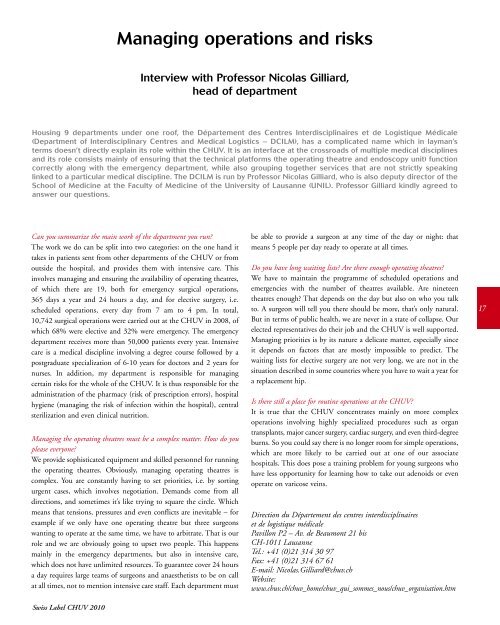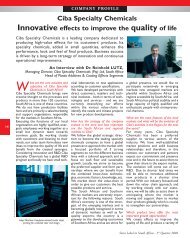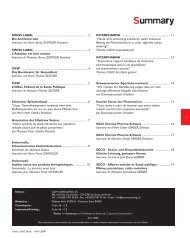SWISS LABEL INFORMATIQUE-XP - Com Consulting SA
SWISS LABEL INFORMATIQUE-XP - Com Consulting SA
SWISS LABEL INFORMATIQUE-XP - Com Consulting SA
You also want an ePaper? Increase the reach of your titles
YUMPU automatically turns print PDFs into web optimized ePapers that Google loves.
Managing operations and risksInterview with Professor Nicolas Gilliard,head of departmentHousing 9 departments under one roof, the Département des Centres Interdisciplinaires et de Logistique Médicale(Department of Interdisciplinary Centres and Medical Logistics – DCILM), has a complicated name which in layman’sterms doesn’t directly explain its role within the CHUV. It is an interface at the crossroads of multiple medical disciplinesand its role consists mainly of ensuring that the technical platforms (the operating theatre and endoscopy unit) functioncorrectly along with the emergency department, while also grouping together services that are not strictly speakinglinked to a particular medical discipline. The DCILM is run by Professor Nicolas Gilliard, who is also deputy director of theSchool of Medicine at the Faculty of Medicine of the University of Lausanne (UNIL). Professor Gilliard kindly agreed toanswer our questions.Can you summarize the main work of the department you run?The work we do can be split into two categories: on the one hand ittakes in patients sent from other departments of the CHUV or fromoutside the hospital, and provides them with intensive care. Thisinvolves managing and ensuring the availability of operating theatres,of which there are 19, both for emergency surgical operations,365 days a year and 24 hours a day, and for elective surgery, i.e.scheduled operations, every day from 7 am to 4 pm. In total,10,742 surgical operations were carried out at the CHUV in 2008, ofwhich 68% were elective and 32% were emergency. The emergencydepartment receives more than 50,000 patients every year. Intensivecare is a medical discipline involving a degree course followed by apostgraduate specialization of 6-10 years for doctors and 2 years fornurses. In addition, my department is responsible for managingcertain risks for the whole of the CHUV. It is thus responsible for theadministration of the pharmacy (risk of prescription errors), hospitalhygiene (managing the risk of infection within the hospital), centralsterilization and even clinical nutrition.Managing the operating theatres must be a complex matter. How do youplease everyone?We provide sophisticated equipment and skilled personnel for runningthe operating theatres. Obviously, managing operating theatres iscomplex. You are constantly having to set priorities, i.e. by sortingurgent cases, which involves negotiation. Demands come from alldirections, and sometimes it’s like trying to square the circle. Whichmeans that tensions, pressures and even conflicts are inevitable – forexample if we only have one operating theatre but three surgeonswanting to operate at the same time, we have to arbitrate. That is ourrole and we are obviously going to upset two people. This happensmainly in the emergency departments, but also in intensive care,which does not have unlimited resources. To guarantee cover 24 hoursa day requires large teams of surgeons and anaesthetists to be on callat all times, not to mention intensive care staff. Each department mustSwiss Label CHUV 2010be able to provide a surgeon at any time of the day or night: thatmeans 5 people per day ready to operate at all times.Do you have long waiting lists? Are there enough operating theatres?We have to maintain the programme of scheduled operations andemergencies with the number of theatres available. Are nineteentheatres enough? That depends on the day but also on who you talkto. A surgeon will tell you there should be more, that’s only natural.But in terms of public health, we are never in a state of collapse. Ourelected representatives do their job and the CHUV is well supported.Managing priorities is by its nature a delicate matter, especially sinceit depends on factors that are mostly impossible to predict. Thewaiting lists for elective surgery are not very long, we are not in thesituation described in some countries where you have to wait a year fora replacement hip.Is there still a place for routine operations at the CHUV?It is true that the CHUV concentrates mainly on more complexoperations involving highly specialized procedures such as organtransplants, major cancer surgery, cardiac surgery, and even third-degreeburns. So you could say there is no longer room for simple operations,which are more likely to be carried out at one of our associatehospitals. This does pose a training problem for young surgeons whohave less opportunity for learning how to take out adenoids or evenoperate on varicose veins.Direction du Département des centres interdisciplinaireset de logistique médicalePavillon P2 – Av. de Beaumont 21 bisCH-1011 LausanneTel.: +41 (0)21 314 30 97Fax: +41 (0)21 314 67 61E-mail: Nicolas.Gilliard@chuv.chWebsite:www.chuv.ch/chuv_home/chuv_qui_sommes_nous/chuv_organisation.htm17














